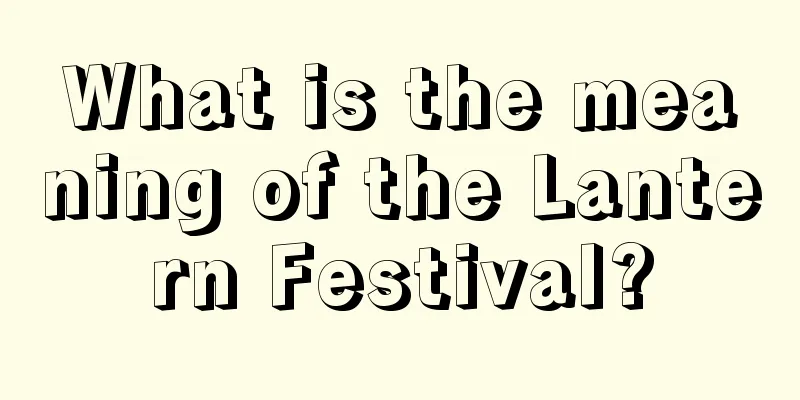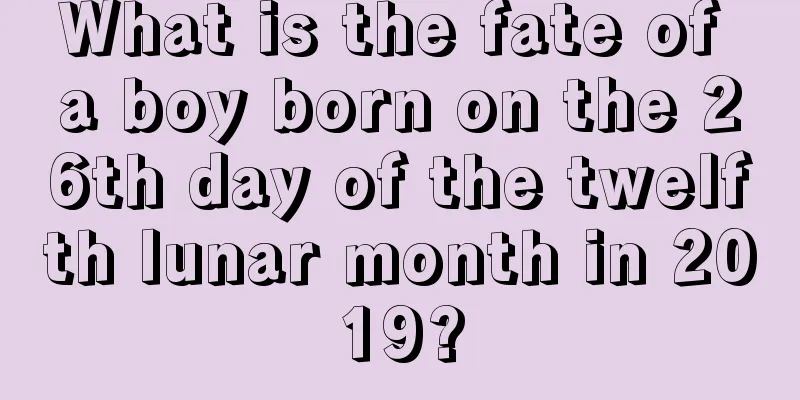What is the meaning of the Lantern Festival?

The Lantern Festival, also known as the Shangyuan Festival, the Little New Year, the Yuanxiao Festival or the Lantern Festival, is the first important festival after the Spring Festival. It is one of the traditional festivals of China, the regions in the Chinese character cultural circle and overseas Chinese. So do you know the meaning of the Lantern Festival? For more details about the 2018 Lunar New Year calendar, please visit the Fortune Teller website for consultation!What is the meaning of the Lantern Festival?The first month of the lunar calendar is the Yuan month, and the ancients called the night "xiao". The fifteenth day is the first full-moon night of the year, so the fifteenth day of the first lunar month is called the Lantern Festival. Also known as the "Lantern Festival". According to Chinese folk tradition, on the festive night when the new year begins and the earth comes back to life, the moon is high in the sky and there are thousands of colorful lanterns on the ground. People watch the lanterns, guess riddles, eat Yuanxiao (Chinese Yuanxiao), and reunite with their families in a joyful atmosphere. Yuanxiao originally meant "the night of the Lantern Festival". Because the main activity of the Lantern Festival on the fifteenth day of the first lunar month is eating glutinous rice balls and admiring the moon at night, the name of the festival later evolved into "Lantern Festival". The celebrations that began on New Year’s Eve will be brought to another climax. On the night of the Lantern Festival, the streets and alleys are decorated with lights, and people admire the lanterns, guess lantern riddles, and eat Lantern Festival dumplings, which has become a custom passed down from generation to generation.Legend of Lantern FestivalLegend about the lamp : It is said that a long time ago, there were many vicious birds and beasts that hurt people and livestock everywhere, so people organized to fight them. A divine bird landed on the earth because it got lost, but was accidentally shot to death by an uninformed hunter. When the Emperor of Heaven learned about it, he was very angry, and immediately issued an order to the heavenly soldiers to set fire to the human world on the fifteenth day of the first lunar month and burn all the people, animals and property in the human world to death. The Emperor of Heaven's daughter was kind-hearted and could not bear to see innocent people suffer, so she risked her life and secretly came to the human world on a auspicious cloud to tell people the news. When everyone heard the news, it was like a loud bang in their heads. They were so scared that they didn't know what to do. After a long time, an old man came up with a solution. He said: on the 14th, 15th and 16th days of the first lunar month, every household should decorate their homes with lanterns, light firecrackers and set off fireworks. In this way, the Emperor of Heaven will think that all the people were burned to death."Everyone nodded in agreement and went to prepare separately. On the night of the fifteenth day of the first lunar month, the Emperor of Heaven looked down and found that the world was full of red light and there was a deafening noise. This happened for three consecutive nights. He thought it was the flame of a big fire and was very happy. In this way, people saved their lives and property. To commemorate this success, every household hangs lanterns and sets off fireworks on the fifteenth day of the first lunar month to commemorate this day. Another legend is that the Lantern Festival was established during the reign of Emperor Wen of Han to commemorate the "suppression of the Lü clan". After the death of Emperor Gaozu of Han, Liu Bang, Liu Ying, the son of Empress Lü, ascended the throne as Emperor Hui of Han. Emperor Hui was cowardly and indecisive by nature, and power gradually fell into the hands of Empress Lu. After Emperor Hui of Han died of illness, Empress Lü took control of the government and turned the Liu family's empire into the Lü family's empire. The old ministers in the court and the Liu family were deeply indignant, but they were afraid of Empress Lü's cruelty and dared not speak out. After Empress Lü died of illness, the Lü clan became extremely worried and fearful of being harmed and ostracized. So, they secretly gathered at the home of General Lu Lu and conspired to make a rebellion in order to completely seize the Liu family's kingdom. This matter reached the ears of Liu Nang, the King of Qi and a member of the Liu clan. In order to protect the Liu clan's kingdom, Liu Nang decided to lead an army to attack the Lü clan. He then contacted Zhou Bo and Chen Ping, two old ministers who had founded the country, and designed a plan to remove Lü Lu. Finally, the "Lü Rebellion" was completely put down. After the rebellion was quelled, the ministers supported Liu Bang's second son Liu Heng to ascend the throne and he was called Emperor Wen of Han. Emperor Wen felt that peace and prosperity were hard-won, so he designated the fifteenth day of the first lunar month, the day when the "Lu Rebellion" was quelled, as a day to celebrate with the people. Every household in the capital decorated their homes with lanterns and streamers to celebrate. From then on, the fifteenth day of the first lunar month became a folk festival celebrated throughout the country - "Lantern Festival". The legend of Dongfang Shuo and the Yuanxiao Girl is related to the custom of eating Yuanxiao: According to legend, Emperor Wu of the Han Dynasty had a favorite minister named Dongfang Shuo, who was kind and humorous. One winter day, after several days of heavy snow, Dongfang Shuo went to the imperial garden to pick plum blossoms for Emperor Wu of Han. As soon as I entered the garden, I saw a palace maid with tears streaming down her face, preparing to jump into a well. Dongfang Shuo rushed forward to rescue her and asked her why she wanted to commit suicide. It turned out that the palace maid was named Yuanxiao, and she had parents and a younger sister at home. Since she entered the palace, she has never had the chance to meet her family again. Every year when the end of the year comes and spring arrives, I miss my family more than usual. I feel that since I cannot fulfill my filial duties to my parents, it would be better to die. Dongfang Shuo felt deeply sympathetic after hearing her story and promised her that he would find a way to reunite her with her family. One day, Dongfang Shuo left the palace and set up a fortune-telling stall on Chang'an Street. Many people vied to ask him for divination. Unexpectedly, everyone’s fortune was the same: “You will be burned to death on the 16th day of the first lunar month.” For a moment, there was great panic in Chang'an. People asked for solutions to the disaster. Dongfang Shuo said, "On the evening of the thirteenth day of the first lunar month, the God of Fire will send a goddess in red to investigate. She is the messenger who was ordered to burn Chang'an. I will give you the copied verses, and you can let the current emperor think of a solution." After that, he threw down a red note and left. The common people took the red card and rushed to the palace to report to the emperor. Emperor Wu of Han took it and saw that it was written: "Chang'an is in danger, the imperial palace will be burned, the fire will last for fifteen days, and the flames will be red at night." He was shocked and quickly invited the resourceful Dongfang Shuo. Dongfang Shuo pretended to think about it and said, "I heard that the God of Fire loves to eat glutinous rice balls. Doesn't Yuanxiao in the palace often make glutinous rice balls for you? You can ask Yuanxiao to make glutinous rice balls on the fifteenth night. Your Majesty should burn incense and offer sacrifices, and order every family in Kyoto to make glutinous rice balls to worship the God of Fire together. Then order your subjects to hang lanterns together on the fifteenth night, and set off firecrackers and fireworks all over the city, as if the whole city is on fire. In this way, you can deceive the Jade Emperor. In addition, notify the people outside the city to enter the city to watch the lanterns on the fifteenth night and mingle with the crowd to ward off disasters and solve problems." After hearing this, Emperor Wu was very happy and ordered to do as Dongfang Shuo suggested. On the fifteenth day of the first lunar month, the city of Chang'an was decorated with lights and colorful lanterns, and tourists were bustling about, making it very lively. The parents of the palace maid Yuanxiao also brought her sister into the city to watch the lanterns. When they saw the big lantern with the word "Yuanxiao" written on it, they shouted in surprise: "Yuanxiao! Yuanxiao!" Yuanxiao heard the shouts and was finally reunited with his family. After such a lively night, Chang'an City was indeed safe and sound. Emperor Wu of Han was overjoyed, and he ordered that every fifteenth day of the first lunar month, people would make glutinous rice balls as a sacrifice to the God of Fire. On the fifteenth day of the first lunar month, the whole city would hang lanterns and set off fireworks. Because the glutinous rice balls made on the Lantern Festival are the best, people call them Yuanxiao, and this day is called the Lantern Festival. |
<<: What is the meaning of the Lantern Festival? What are the customs of the Lantern Festival?
>>: Is it a good day to travel on the 25th day of the first lunar month in 2019?
Recommend
Is the fate of a girl born on the fourth day of the eleventh lunar month in 2018 good or bad?
The fourth day of the eleventh lunar month in 2018...
Query the God of Wealth's position on the Autumnal Equinox on August 17, 2021
Each season is divided into three months: Meng, Zh...
Is the first day of September in the lunar calendar 2021 an auspicious day for travel? Travel Guide
Summarizing life experience, we often find that it...
What is the lunar calendar date for the 15th day of the first lunar month in 2022? What does the "Yuan" in Lantern Festival mean?
The good and bad days in the lunar calendar are di...
What are the do’s and don’ts on the ninth day of the second lunar month in 2018?
The beautiful spring has arrived, flowers are blo...
What to eat during the Grain Rain solar term in 2019? When is the Grain Rain in 2019?
Introduction: Grain Rain is one of the important s...
Where is the God of Happiness in 2020? Is the day good?
The quality of life is different every day, so let...
Is it a good day to get a haircut on the tenth day of the eighth lunar month in 2019, the White Dew solar term?
The White Dew solar term means "cool breeze a...
What is the auspicious date for the birth of a tiger boy in May of the lunar calendar in 2022? When is the best time to be born?
What is the auspicious date for the birth of a tig...
Is it good to burn incense and pray on August 25, 2020? Check the lucky position of the God of Wealth on October 11
Introduction: It is necessary to choose an auspici...
Is the 20th day of the twelfth lunar month in 2018 suitable for offering sacrifices? What are the particulars of offering sacrifices?
Introduction: Different days unfold in different w...
Is it a good idea to pick up the car between April 4th and April 26th, 2020, the Year of the Rat?
Don’t be in a hurry to pick up the car, you must ...
Can we offer sacrifices on the 29th day of the fifth lunar month in 2018?
On May 29th of the lunar calendar in 2018, the las...
What is the fate of a baby girl born on April 20th of the lunar calendar in 2020 (5.12)?
There are many different opinions about destiny. B...
Is the fifth day of the fourth lunar month in 2020 a good day? What date is it in the Gregorian calendar?
The leap month is a month that appears to balance...









